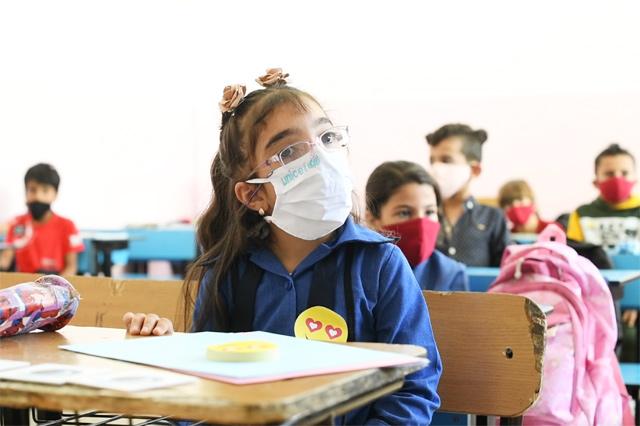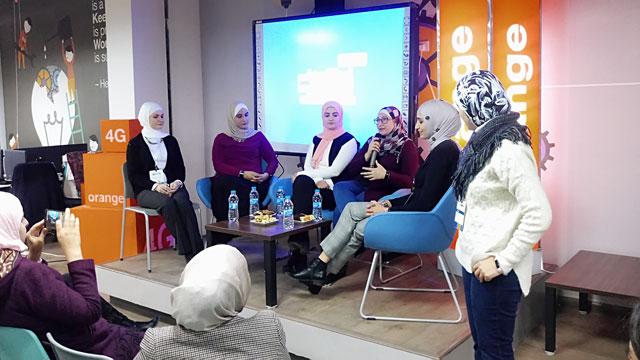You are here
Despite progress, equitable access to education remains a challenge — UNICEF
By Hanna Davis - Oct 06,2021 - Last updated at Oct 06,2021

Seleen Fadi Al Mathloom, an eight-year-old girl with cerebral palsy, attends class at Khawla Bint Al Azwar School in Sahab in this recent photo (Photo courtesy of UNICEF)
AMMAN — The return to in-class education for children with disabilities remains a great challenge for many under-resourced public schools in Jordan, according to UNICEF.
The influx of over 1,300,000 Syrian refugees has pressured the Kingdom’s public education system, making it even more difficult to accommodate for children with special needs, said a UNICEF statement sent to The Jordan Times.
“Equitable access to education for the most vulnerable children is still a challenge,” UNICEF Jordan Representative Tanya Chapuisat told The Jordan Times in an e-mail interview.
She said that 2015 figures from the Department of Statistics (DoS) show that 79 per cent of persons with disabilities did not have the opportunity to go to school.
Up to 30 per cent of Syrian refugees have specific physical or intellectual needs and around 6 per cent of children in the Kingdom have a mild to severe disability, according to the statement.
The pandemic-induced online learning led to further challenges for children with disabilities. “This was due the limited ability or time for many parents to support learning, and the lack of accessibility of online learning for children with particular disabilities,” said Chapuisat.
Seleen Fadi Al Mathloom, an eight-year-old girl with cerebral palsy, returned to her classes in September.
Saleen’s mother, Ala’a Jamal Abdul Naser, who fled Syria in 2013, has helped her daughter overcome obstacles to continue her education.
“Education is a must for my daughter, for her future. I went to school and I want the same for my daughter,” Ala’a told The Jordan Times.
“For my kids, it’s more psychologically and mentally important for them to be back in school. At home, they were not engaged, but now, they are climbing back and are more active in the classroom,” she said.
“I prefer go to school rather than online because I love my school and teacher,” Seleen said.
However, the return to in-class education has its own challenges.
“I do everything... I carry her to school, I go to class with her, I help her with the bathroom,” said Ala’a.
“Transportation is the hardest for me. I have to go there [to school] and return with her,” she said.
Learning support
UNICEF, in coordination with the Ministry of Education and their implementing partners, supports more than 5,000 children with disabilities and has fully integrated them in 100 schools across Jordan, including camps, according to the UNICEF statement.
These children attend regular classes and are provided with additional learning support, such as “shadow teachers” and physiotherapy.
Khawla Bint Al Azwar School in Sahab, Amman, where Seleen studies, is one of the “most invested” schools in inclusive education in the Kingdom, said Khalid Elayan, Education Team Leader for Mercy Corps, one of UNICEF’s implementing partners.
The principle of Khawla Bint Al Azwar School, Jihad Mifleh Al Raheelah, has helped make accommodations for over 90 students with disabilities. When making accommodations, Raheelah faces “major challenges” with the school’s infrastructure, Raheelah told The Jordan Times.
Each year, Raheelah rearranges the classrooms to ensure the students have the necessary accommodations.
For Seleen, Raheelah said: “She was on a higher floor, and said she was too tired to go up and down. So, we moved her class to the basement so she could more easily get to the suitable bathroom.”
Furthermore, Raheelah pointed to the difficulty in finding schools for boys with disabilities. Like many other schools with inclusive education programmes, Raheelah can only accommodate boys until the 3rd or 4th grade, when the school becomes separated by gender.
“In this area, this is the only school with an inclusive education programme,” she said. So, the boys must drive long distances or move homes to reach other schools that have the programmes, she added.
Funding shortages
Funding shortages have made it difficult to provide any additional support, observed Elayan from Mercy Corps.
“Two years ago, we supported more than 300 students for rehabilitation sessions. Now, we can only support around 100. Every year, the funding has decreased,” he said.
Two years ago Seleen had physiotherapy sessions, according to Ala’a. Before the sessions, Ala’a said, “she couldn’t hold a pen, now, she can and she’s writing better and faster”.
However, recently, no physiotherapy has been allocated to her, according to Ala’a. “They told me that they don’t have more funds,” she said.
Despite challenges, Seleen will continue to go to school. “I like to go to school to play [with friends]. My friends help me and I help them,” she said.
Related Articles
AMMAN (UNICEF) — With a sense of purpose and responsibility, Naifeh Louzi, the principal of Saied Ala’a Eddin public school in Abu Nusair ha
AMMAN — Minister of Education and Higher Education Walid Maani on Friday directed the Department of Special Education to enrol a physically
AMMAN — Jordanian women leaders in science, technology, engineering and mathematics (STEM) are offered the opportunity to compete for a ment














